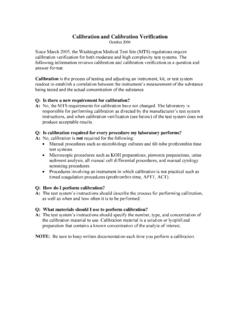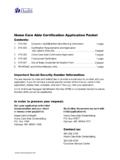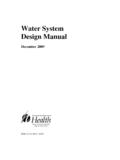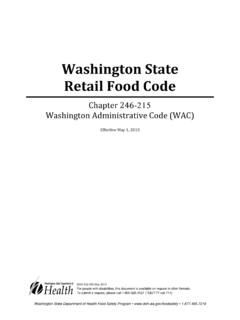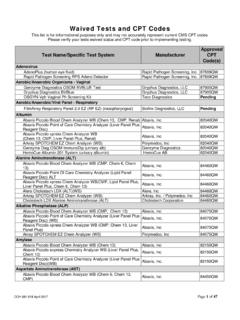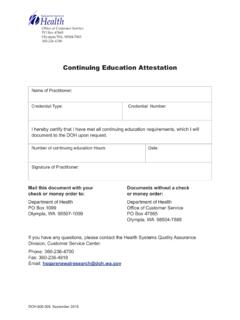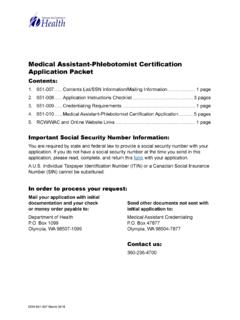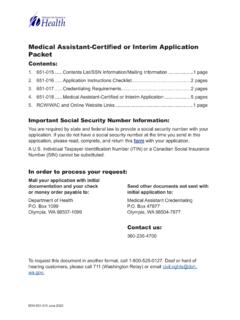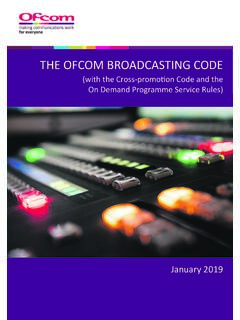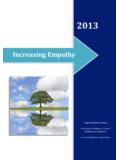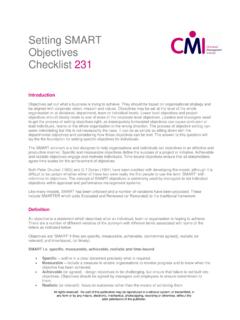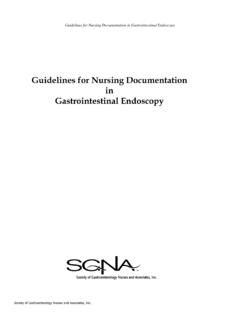Transcription of Personal Protective Equipment (PPE) for Long-Term Care ...
1 Updated November 22, 2021 DOH 204-304 | 1 Personal Protective Equipment (PPE) for Long-Term Care Settings during the COVID-19 Pandemic Health Care Personnel (HCP) in Long-Term care facilities (LTCF) should adhere to Standard Precautions AND the following PPE requirements according to Transmission-based Precautions. When caring for residents in transmission-based precautions for confirmed or suspected COVID-19, HCP must wear appropriate PPE including: NIOSH-approved respirator (N95, N95 equivalent, or higher-level respirator) Gown Gloves Eye protection This document provides tools for LTCFs and HCP to quickly determine what PPE is appropriate in different circumstances.
2 For PPE strategies in Memory Care Units, see the COVID 19 Infection Prevention Best Practices for Memory Care Units guidance document. These tools provide general guidance and do not cover all possible scenarios. Use Table 1 to determine what PPE to wear, and Table 2 for guidance on how to use the PPE. Table 1 PPE Residents, HCPs, and Visitors Should Wear in Resident Care Settings Table 2 HCPs: How to Use PPE Definitions For complete information about PPE use and source control please refer to: Division of Occupational Safety and Health (DOSH) Directive Interim Infection Prevention and Control Recommendations for Healthcare Personnel During the Coronavirus Disease 2019 (COVID-19) Pandemic Optimizing Supply of PPE and Other Equipment during Shortages Recommendations for Cohorting in Long-Term Care Facilities During the COVID-19 Pandemic SARS-CoV-2 Source Control in Healthcare Settings ( ) Using Personal Protective Equipment (PPE)
3 Interim Infection Prevention and Control Recommendations for Healthcare Personnel During the Coronavirus Disease 2019 (COVID-19) Pandemic LTCFs should be using conventional PPE strategies unless actively experiencing shortages. If experiencing shortages, LTCFs should implement contingency strategies only after all conventional strategies have been implemented and in coordination with their LHJ. Table 1 - PPE Residents, HCPs, and Visitors Should Wear in Resident Care Settings Source Control PPE Comments What To Cloth face covering Procedure mask (medical-grade facemask) Respirator (N95, and others) Respirators* (Fit tested N95, and others) Eye Protection Gown Gloves Always practice good hand hygiene!
4 Always use Standard Precautions plus any posted Transmission Based Precautions (TBP). RESIDENTS Presumed or confirmed COVID+ Stay in room as much as possible. Wear mask if need to leave room or when within 6 feet of others, if possible. If shortages, facemasks should be prioritized for HCP. Presumed healthy Wear mask when out of room or when others (excluding roommate) are in their room. HEALTH CARE PERSONNEL (employed or contracted) Close contact with residents presumed or confirmed COVID+, or in observation/quarantine Practice single use disposable PPE (one per resident per encounter).
5 Discard disposable PPE after each use, and when soiled. Disinfect reusable PPE. See Table 2 for recommendations for use in COVID+ unit/cohort. Aerosol Generating Procedures (AGPs)** Wear all PPE during AGPs and up to 3 hours after the procedure. Practice single use disposable PPE (one per resident per encounter) for AGPs; discard after each use, and when soiled. Close contact with residents presumed healthy Discard disposable eye protection after each use, and when soiled. No contact with residents Wear N95 (or other respirator) as voluntary use or facility policy.
6 VISITORS and ESSENTIAL SUPPORT PERSONS (ESP) (Follow LTCF Safe Start guidance) Visiting resident in isolation or quarantine for COVID+ Remote visit preferred. Follow CDC guidelines and additional facility procedures. Avoid being present during AGPs. Visiting resident presumed healthy Plus Standard Precautions and any posted TBP. *If respirator is unavailable, contact your LHJ and follow CDC s optimization strategies. Document attempts to procure additional respirators. In shortages, respirators should be prioritized for care of residents with known or suspected COVID-19 or AGPs.
7 **See DOH guidance on Infection Control for Aerosol Generating Procedure (AGP) Table 2 - HCPs: How to Use PPE Source Control or Universal Use COVID+ (single resident), or AGP, or Quarantine COVID+ unit/ Cohort* Other instructions N95 Respirator N95 voluntary. If used for universal source control, and not PPE for Transmission Based Precautions (TBP) or AGP), may be worn until moist, soiled or damaged, then discard. Contact your supervisor for where to get more N95s. Fit-tested N95 or higher respirator required. Use one for one resident encounter, then discard.
8 Don new N95 for next resident. Discard N95 when soiled, wet, damaged. Fit-tested N95 or higher respirator required. For multiple residents with same COVID+ status, extend N95 use. Discard after leaving area/unit, when N95 becomes wet, soiled or damaged, and after leaving the space in which any AGPs are performed. For disposable respirator, single use, then discard when N95 is required. If used as source control only (not PPE), N95 fit test is not required. See note below for reusable respirators. Facemask (surgical mask) May be worn until moist, soiled or damaged, then discard.
9 Dispose of facemask when removed. Do not re-use. Do not use surgical mask for COVID+ resident or AGPs. Do not use surgical mask for COVID+ resident or AGPs. For resident care, single use, then discard. Cloth masks are not surgical masks and should not be used by HCP at worksite. Eye Protection Extend use of eye protection: Disposable: Wear during multiple resident encounters without removing it between residents. Remove it when leaving the care area. Discard. Re-usable: Same as disposable, but do not discard, instead disinfect**; store for next use. Disposable: Single use, then discard.
10 Re-usable: Use for one resident encounter, then disinfect**. Store for next use. Throughout the unit, extend use of eye protection. Use same eye protection for multiple residents with same COVID status. Doff and disinfect** reusable eye protection when leaving area. Store re-usable eye protection for next use. Your facility provides the proper disinfectant for the organism. Do not use damaged Equipment . For re-usable eye protection: After all AGPs, doff and disinfect** between resident encounters. Gown No gowns needed for source control. Use according to standard and TBP.
